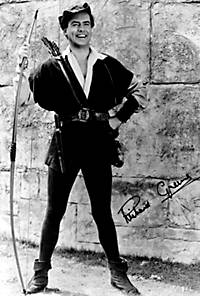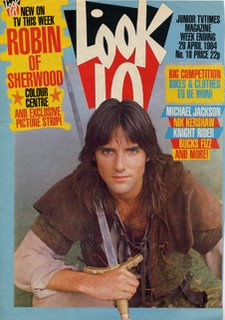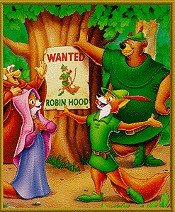Bad Matthew regularly does a nice little precis of left publications which is often useful and fun. I notice in his latest review he chooses this week's Socialist Worker in which Judy Cox has a piece on Robin Hood (here) which also links to a review of the new TV show (here) I caught the end of the show and feel pretty dismissive of it, despite the fact that there was a pleasant twist in the usual Robin - nobleman turned outlaw. Here we have a Robin who was a landowner whose peasants were his possessions, had them stolen from him whilst he was away and becomes an outlaw because he's piqued that he's no longer in charge. Well, that's the way I saw it.
I caught the end of the show and feel pretty dismissive of it, despite the fact that there was a pleasant twist in the usual Robin - nobleman turned outlaw. Here we have a Robin who was a landowner whose peasants were his possessions, had them stolen from him whilst he was away and becomes an outlaw because he's piqued that he's no longer in charge. Well, that's the way I saw it.
There was also a pukka little line about standing shoulder to shoulder with the Pope in his war on the Middle East. Thing is, although I liked the line it is also one of the reasons I didn't like the show - in that it felt like a show made with modern manners and sensibilities rather than a retelling of a centuries old legend.
Although any artistic production cannot escape the time and culture that produces it it is possible to produce an air of authenticity without going the whole hog and having to speak in old English and incorporate the most alien aspects of feudal ideology.
Look at the classic Sean Connery Hood, whilst SW thinks the fight scenes in the modern version were brilliant I thought they were stupid, Sean showed you don't need to have a kung foo kicking perfect archer and acrobat to have exciting battles. I would have thought we get most excited when we are lost in the moment and feel there is a real element of danger. Sean was slightly crap in that he got hurt when people hacked him, could not guarantee he'd hit the target and he made mistakes. That meant that when/if he won there was some sort of achievement and sense of victory. We were involved, and when he dies at the end it's very, very sad. When, in this new show, Robin effortlessly throws his sword 50 meters from ground level to strike *two* enemy soldiers on the battlements who are holding his friend between them, knocking them out and leaving laughing boy free to make his escape it would have been hard for me to feel less enthused. OK I get it, Robin's like really, really amazing. It says so in the script so he can do anything, no matter how unlikely. Wow.
When, in this new show, Robin effortlessly throws his sword 50 meters from ground level to strike *two* enemy soldiers on the battlements who are holding his friend between them, knocking them out and leaving laughing boy free to make his escape it would have been hard for me to feel less enthused. OK I get it, Robin's like really, really amazing. It says so in the script so he can do anything, no matter how unlikely. Wow.
Incidently the Sean Connery version is the only one I've seen where Audrey Hepburn's "Maid Marion" convincingly fuses the role of a strong independent minded woman with that of the social coventions of a society that had very set ideas of a woman's place. Others have often been a strange mixture of love interest with girl power fighting ability, neither achieving any worthwhile character development or giving the impression that women in feudal society had restrictions placed on them.
The power of the legend, for me, is the wildness of a rebel who will not bend the knee and creates an autonomous free 'state' in Sherwood forest. He lives his own life, despite the consequences. A heavily stage managed, self referential drama with lots of ironic postmodern winking at the viewer simply does not do justice to the story. It doesn't tell it properly. The eighties version with lots of pre-Christian weirdness was much better because you felt they lived in a forest and fought for freedom (and Ray Winston's Will Scarlett was a proper murdering bastard, exactly the sort you'd need to fight off the massed forces of the state).
Judy Cox is always interesting on the real roots of Robin Hood and how it was a modern invention that any successful outlaw that was being portrayed in a positive way *had* to have been a member of the aristocracy. I mean an oik could never be charismatic, well loved and outsmart the law could they? I also think it's worth remembering that the 'real' Robin Hood was not one person but almost a title that someone might confer on themselves when they lived outside the law. Just as in later centuries highwaymen would often described themselves as "Dick Turpin" (although he was a real person too), rural labourers might sign death threats "Captain Swing" or industrial workers go under the banner "General Ludd".
I also think it's worth remembering that the 'real' Robin Hood was not one person but almost a title that someone might confer on themselves when they lived outside the law. Just as in later centuries highwaymen would often described themselves as "Dick Turpin" (although he was a real person too), rural labourers might sign death threats "Captain Swing" or industrial workers go under the banner "General Ludd".
I'm absolutely for the retelling of stories in new ways, this is entirely in keeping how these stories developed in the first place anyway. We should be reworking Beowulf and Grendel, the Trojan Wars (oh Brad Pitt's bottom lip... sigh) and the tales from King Arthur's court, but I suppose my main worry is that a slick, made for profit, "isn't it about time we squeezed more out of Robin Hood" version doesn't contribute to the genre only detracts from it.
Of course, I'm never satisfied when it comes to these matters, so judge for yourself - but never say you were not warned. I simply think adventure stories in general suffer when the emphasis is on production values and amazing feats rather than character, plot and the overcoming of difficulties by real, fallible human beings.
Wednesday, October 11, 2006
Wild bees and the redistribution of wealth
Labels: Culture
Subscribe to:
Post Comments (Atom)

1 comment:
The TV show "Robin Hood", in the 1950s, with Richard Green, had blacklisted writers, using aliases.
Post a Comment